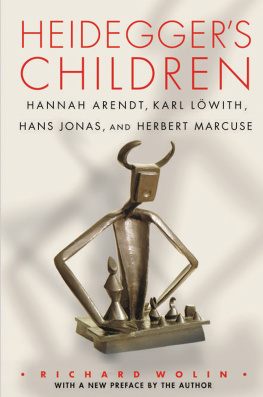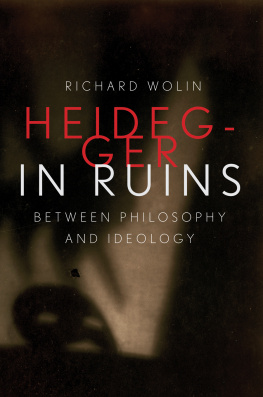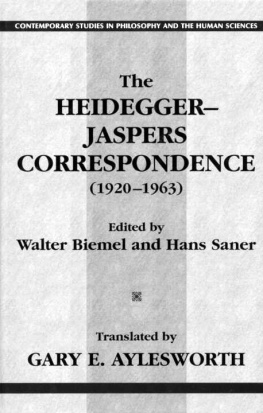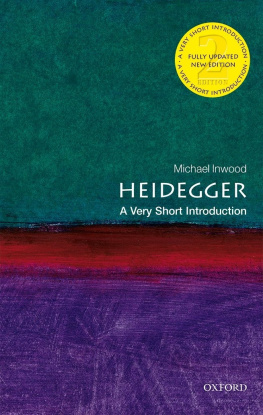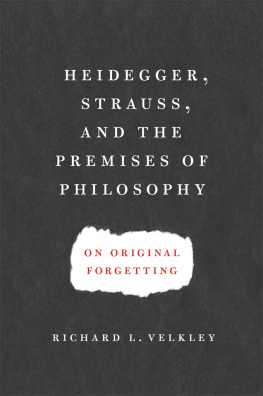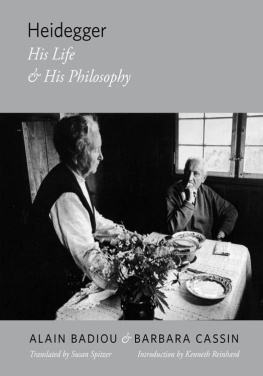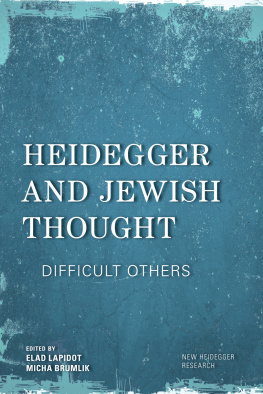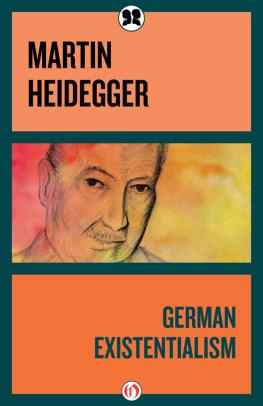Richard Wolin - Heideggers Children: Hannah Arendt, Karl Löwith, Hans Jonas, and Herbert Marcuse
Here you can read online Richard Wolin - Heideggers Children: Hannah Arendt, Karl Löwith, Hans Jonas, and Herbert Marcuse full text of the book (entire story) in english for free. Download pdf and epub, get meaning, cover and reviews about this ebook. year: 2015, publisher: Princeton University Press, genre: Religion. Description of the work, (preface) as well as reviews are available. Best literature library LitArk.com created for fans of good reading and offers a wide selection of genres:
Romance novel
Science fiction
Adventure
Detective
Science
History
Home and family
Prose
Art
Politics
Computer
Non-fiction
Religion
Business
Children
Humor
Choose a favorite category and find really read worthwhile books. Enjoy immersion in the world of imagination, feel the emotions of the characters or learn something new for yourself, make an fascinating discovery.
- Book:Heideggers Children: Hannah Arendt, Karl Löwith, Hans Jonas, and Herbert Marcuse
- Author:
- Publisher:Princeton University Press
- Genre:
- Year:2015
- Rating:5 / 5
- Favourites:Add to favourites
- Your mark:
Heideggers Children: Hannah Arendt, Karl Löwith, Hans Jonas, and Herbert Marcuse: summary, description and annotation
We offer to read an annotation, description, summary or preface (depends on what the author of the book "Heideggers Children: Hannah Arendt, Karl Löwith, Hans Jonas, and Herbert Marcuse" wrote himself). If you haven't found the necessary information about the book — write in the comments, we will try to find it.
Martin Heidegger is perhaps the twentieth centurys greatest philosopher, and his work stimulated much that is original and compelling in modern thought. A seductive classroom presence, he attracted Germanys brightest young intellects during the 1920s. Many were Jews, who ultimately would have to reconcile their philosophical and, often, personal commitments to Heidegger with his nefarious political views.
In 1933, Heidegger cast his lot with National Socialism. He squelched the careers of Jewish students and denounced fellow professors whom he considered insufficiently radical. For years, he signed letters and opened lectures with Heil Hitler! He paid dues to the Nazi party until the bitter end. Equally problematic for his former students were his sordid efforts to make existential thought serviceable to Nazi ends and his failure to ever renounce these actions.
This book explores how four of Heideggers most influential Jewish students came to grips with his Nazi association and how it affected their thinking. Hannah Arendt, who was Heideggers lover as well as his student, went on to become one of the centurys greatest political thinkers. Karl Lwith returned to Germany in 1953 and quickly became one of its leading philosophers. Hans Jonas grew famous as Germanys premier philosopher of environmentalism. Herbert Marcuse gained celebrity as a Frankfurt School intellectual and mentor to the New Left.
Why did these brilliant minds fail to see what was in Heideggers heart and Germanys future? How would they, after the war, reappraise Germanys intellectual traditions? Could they salvage aspects of Heideggers thought? Would their philosophy reflect or completely reject their early studies? Could these Heideggerians forgive, or even try to understand, the betrayal of the man they so admired? Heideggers Children locates these paradoxes in the wider cruel irony that European Jews experienced their greatest calamity immediately following their fullest assimilation. And it finds in their responses answers to questions about the nature of existential disillusionment and the juncture between politics and ideas.
Richard Wolin: author's other books
Who wrote Heideggers Children: Hannah Arendt, Karl Löwith, Hans Jonas, and Herbert Marcuse? Find out the surname, the name of the author of the book and a list of all author's works by series.

